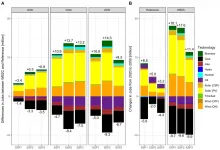Policing the digital divide: How racial bias can limit Internet access for people of color
New research shows that the policing of nonviolent offenses, like loitering, restricts access to free Wi-Fi, particularly for people of color
2021-07-23
(Press-News.org) Coffee shops and casual restaurants are an important part of American life. Even beyond the food and drinks they sell, they offer us a place to use the restroom or rest our feet while we're out and about, and they provide internet access to those on the go, those in need of a temporary office, or those who don't have an internet connection at home. Many of us take for granted that a nearby Starbucks or McDonald's can offer us a little respite, even if we don't always make a purchase.
But access to these sorts of quasi-public spaces isn't always equal in America, particularly for Black people and other people of color. One such example of this is the infamous 2018 incident in Philadelphia when two Black men waiting at Starbucks for an acquaintance were arrested for loitering. The national outcry over their biased and unjust treatment led to a change in Starbucks' corporate policy. It also begs the question: how often does this kind of incident happen around the country and what implications does it have?
A new study published in the Journal of Communication from researchers at the Annenberg School for Communication at the University of Pennsylvania investigated the ways that institutions control who has access to Wi-Fi. The findings indicate that powerful institutions and privileged people use quality-of-life policing -- the report and/or arrest of individuals engaged in nonviolent offenses such as loitering, noise violations, and public intoxication -- to keep those with less privilege, including people of color, from accessing resources like the internet.
The inspiration for the study came from a story Professor Julia Ticona heard while interviewing gig workers for her forthcoming book, Left to Our Own Devices: Coping with Insecure Work in a Digital Age (Oxford University Press). One of her interviewees, a 20-year-old Black man named Alex, had a Starbucks manager threaten to call the police on him because he was using an outlet and the internet.
"I was so frustrated for him personally," says Ticona. "And I was also frustrated that we so often talk about the digital divide as a matter of people not being able to afford access, entirely omitting from the discussion that people are actively being threatened for using the internet."
Ticona shared her frustration with Professor Yphtach Lelkes and doctoral candidate Tian Yang, and the three scholars joined forces to develop a method for investigating whether and how institutions are policing access to the internet.
"This paper is a great example of disciplinary cross-fertilization" says Lelkes. "Julia and I have offices across the hall from one another, and Tian was working with me as a research fellow and taking Julia's class at the time. This project came about because Annenberg is such a big tent when it comes to methods and ways of thinking, and the school encourages collaborations between its various scholars."
The researchers analyzed publicly available data to determine whether quality-of-life policing increased, decreased, or remained the same once free Wi-Fi was introduced to restaurants -- namely Burger King, McDonald's, Panera, Starbucks, and Wendy's -- in various neighborhoods in Chicago between 2008 and 2016. They compiled their own dataset for the study, combining crime data from the police department, neighborhood information from the U.S. Census Bureau, and the locations of stores listed on business licenses.
"We were excited to be able to establish a causal relationship between institutional dynamics and their outcomes in perpetuating social inequalities," says Yang. "To do this, we applied methods used in economics and other fields to develop a way to analyze the data for answers to our questions."
The researchers found that wealthier, whiter neighborhoods had a 5% increase in quality-of-life complaints to the police after restaurants began offering internet access, while other neighborhoods did not. They also found that those same wealthy, white neighborhoods did not have an increase in the report of other kinds of crime, like assault or burglary. The researchers believe their findings suggest that economic hurdles aren't the only factor shaping people's internet access, but that active exclusion from public spaces -- where some people are allowed to enjoy Wi-Fi and others aren't -- also contributes to the digital divide.
"This paper connects ongoing conversations about the role of institutions in perpetuating white supremacy and privilege in the digital age to long-standing questions about digital access," says Ticona. "We hope this study can contribute to the efforts to have a different kind of conversation in the field of Communication about the role of policing, race, and class in reinforcing digital inequalities."
INFORMATION:
The study, entitled "Policing the Digital Divide: Institutional Gate-Keeping and Criminalizing Digital Inclusion," was published in the Journal of Communication. Authors include Tian Yang, Julia Ticona, and Yphtach Lelkes.
ELSE PRESS RELEASES FROM THIS DATE:
2021-07-23
BIRMINGHAM, Ala. - There are many reasons that an intranasal vaccine against the SARS-CoV-2 virus would be helpful in the fight against COVID-19 infections, University of Alabama at Birmingham immunologists Fran Lund, Ph.D., and Troy Randall, Ph.D., write in a viewpoint article in the journal Science.
That route of vaccination gives two additional layers of protection over intramuscular shots because it produces: 1) immunoglobulin A and resident memory B and T cells in the respiratory mucosa that are an effective barrier to infection at those sites, and 2) cross-reactive resident memory B and T cells that can respond earlier than other immune cells if a viral variant does start ...
2021-07-23
July 23, 2021 - Last year, the American Cancer Society (ACS) issued an updated set of guidelines for cervical cancer screening - emphasizing the shift toward screening with primary human papillomavirus (HPV) testing. While the ACS recommendation accounts for a transition period to implement primary HPV screening, additional factors should be considered to operationalize these guidelines, according to a special white paper in the July issue of the Journal of Lower Genital Tract Disease (JLGTD), official journal of ASCCP. The journal is published in the Lippincott portfolio by Wolters Kluwer.
In the article, the ASCCP Cervical ...
2021-07-23
Rainforests are a powerful, natural solution to combat climate change -- providing water filtration, capturing carbon and regulating global temperatures. But major threats like large-scale land use changes, including agricultural expansion and clearcutting, have turned these biodiversity havens into one of the most endangered habitats on our planet.
In 2019, select scientists, including the University of Delaware's Rodrigo Vargas, met at the National Geographic headquarters in Washington, D.C., to discuss the threats to rainforests. The researchers pinpointed a need to develop a worldwide tracking system, which would find trends to help fight land degradation ...
2021-07-23
Attitudes toward diversity vary, and its meaning can often be difficult to find consensus about in an increasingly diverse but politically polarized nation such as the United States.
In a report published by Personality and Social Psychology Bulletin, University of Illinois Chicago researchers detail findings from three studies that explore the connection between political ideology, attitudes, and beliefs toward diversity.
"Our studies explored the possibility that attitudes toward 'diversity' are multidimensional rather than unidimensional and that ideological differences in diversity attitudes vary as a function of diversity subtype," said the report's ...
2021-07-23
Researchers created a global dataset of job footprints in 50 countries and used a model to investigate how trying to meet the Paris Agreement global climate target of staying well below 2°C would affect energy sector jobs. They found that action to reach said target would increase net jobs by about 8 million by 2050, primarily due to gains in the solar and wind industries. The analysis appears July 23 in the journal One Earth.
"Currently, an estimated 18 million people work in the energy industries--a number that is likely to increase, not decrease, to 26 million or by over 50% if we reach our global climate targets," says corresponding author Johannes Emmerling (@JohannesEmm), an environmental economist at the RFF-CMCC ...
2021-07-23
Humid tropical forests, vital in global efforts to limit rising temperatures, are under threat as a result of changes in land use and climate. Now, researchers reporting in the journal One Earth on July 23 have developed a new way to keep tabs on the vulnerability of these forests on a global scale using satellite data. Called the tropical forest vulnerability index (TFVI), the hope is that this method will serve as an early warning for areas that are under the greatest threat to enable actions aimed at protecting these forests before it's too late.
"Frequent droughts, higher temperature, and longer dry seasons, along with increasing pressures from deforestation and ...
2021-07-23
As opioid overdose deaths rose during the COVID-19 pandemic, people seeking treatment for opioid addiction had to wait nearly twice as long to begin methadone treatment in the United States than in Canada, a new Yale study has shown.
In both countries during the pandemic, about one in 10 methadone clinics were not accepting new patients and a third of those cited COVID-19 as the reason, according to research published July 23 in the journal JAMA Network Open.
An estimated 90,000 people in the United States died from drug overdoses last year.
"We missed opportunities to save lives," said Paul Joudrey, assistant professor of internal medicine at the Yale School of Medicine and corresponding author of the paper.
The findings highlight shortcomings providing prompt ...
2021-07-23
EVANSTON, Ill., --- One of the keys to a long life may lie in your net worth.
In the first wealth and longevity study to incorporate siblings and twin pair data, researchers from Northwestern University analyzed the midlife net worth of adults (mean age 46.7 years) and their mortality rates 24 years later. They discovered those with greater wealth at midlife tended to live longer.
The researchers used data from the Midlife in the United States (MIDUS) project, a longitudinal study on aging. Using data from the first collection wave in 1994-1996 through a censor date of 2018, the researchers used survival ...
2021-07-23
From the thrill of hearing an ice cream truck approaching to the spikes of pleasure while sipping a fine wine, the neurological messenger known as dopamine has been popularly described as the brain's "feel good" chemical related to reward and pleasure.
A ubiquitous neurotransmitter that carries signals between brain cells, dopamine, among its many functions, is involved in multiple aspects of cognitive processing. The chemical messenger has been extensively studied from the perspective of external cues, or "deterministic" signals. Instead, University of California San Diego researchers recently ...
2021-07-23
What The Study Did: Researchers investigated the association between net worth at midlife and subsequent longevity in individuals as well as with siblings and twins.
Authors: Eric D. Finegood, Ph.D., of Northwestern University in Evanston, Illinois, is the corresponding author.
To access the embargoed study: Visit our For The Media website at this link https://media.jamanetwork.com/
(doi:10.1001/jamahealthforum.2021.1652)
Editor's Note: The article includes conflicts of interest and funding/support disclosures. Please see the article for additional information, including ...
LAST 30 PRESS RELEASES:
[Press-News.org] Policing the digital divide: How racial bias can limit Internet access for people of color
New research shows that the policing of nonviolent offenses, like loitering, restricts access to free Wi-Fi, particularly for people of color



